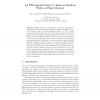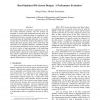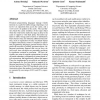1416 search results - page 2 / 284 » Optimizing Write Performance for Read Optimized Databases |
FAST
2008
13 years 7 months ago
2008
Operating system memory managers fail to consider the population of read versus write pages in the buffer pool or outstanding I/O requests when writing dirty pages to disk or netw...
DASFAA
2011
IEEE
12 years 9 months ago
2011
IEEE
Flash memories are considered a competitive alternative to rotating disks as non-volatile data storage for database management systems. However, even if the Flash Translation Layer...
DEXAW
1997
IEEE
13 years 9 months ago
1997
IEEE
As main memory capacity increases, more of the database read requests will be satis ed from the bu er system. Consequently, the amount of disk write operations relative to disk re...
ICDE
1991
IEEE
13 years 8 months ago
1991
IEEE
This paper presents a performance comparison of several file system allocation policies. The file systems are designed to provide high bandwidth between disks and main memory by...
POS
1998
Springer
13 years 9 months ago
1998
Springer
Persistent programming languages manage volatile memory as a cache for stable storage, imposing a read barrier on operations that access the cache, and a write barrier on updates ...



